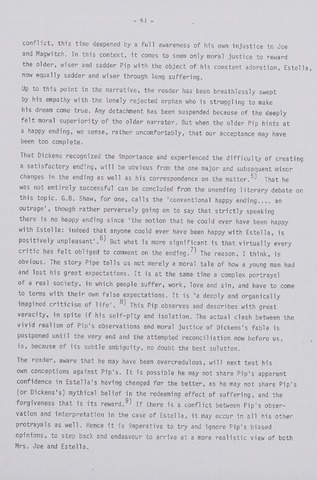conflict, this time deepened by a full awareness of his own injustice to Joe
and Magwitch. In this context, it comes to seem only moral justice to reward
the older, wiser and sadder Pip with the object of his constant adoration, Estella,
now equally sadder and wiser through long suffering.
Up to this point in the narrative, the reader has been breathlessly swept
by his empathy with the lonely rejected orphan who is struggling to make
his dream come true. Any detachment has been suspended because of the deeply
felt moral superiority of the older narrator. But when the older Pip hints at
a happy ending, we sense, rather uncomfortably, that our acceptance may have
been too complete.
That Dickens recognized the importance and experienced the difficulty of creating
a satisfactory ending, will be obvious from the one major and subsequent minor
51
changes in the ending as well as his correspondence on the matter. That he
was not entirely successful can be concluded from the unending literary debate on
this topic. G.B. Shaw, for one, calls the 'conventional happy ending.... an
outrage', though rather perversely going on to say that strictly speaking
there is no happy ending since 'the notion that he could ever have been happy
with Estella: indeed that anyone could ever have been happy with Estella, is
positively unpleasant'.6-® But what is more significant is that virtually every
critic has felt obliged to comment on the ending.^ The reason, I think, is
obvious. The story Pipe tells us not merely a moral tale of how a young man had
and lost his great expectations. It is at the same time a complex portrayal
of a real society, in which people suffer, work, love and sin, and have to come
to terms with their own false expectations. It is 'a deeply and organically
imagined criticism of life'. This Pip observes and describes with great
veracity, in spite if his self-pity and isolation. The actual clash between the
vivid realism of Pip's observations and moral justice of Dickens's fable is
postponed until the very end and the attempted reconciliation now before us,
is, because of its subtle ambiguity, no doubt the best solution.
The reader, aware that he may have been overcredulouswill next test his
own conceptions against Pip's. It is possible he may not share Pip's apparent
confidence in Estella's having changed for the better, as he may not share Pip's
(or Dickens's) mythical belief in the redeeming effect of suffering, and the
forgiveness that is its reward. If there is a conflict between Pip's obser
vation and interpretation in the case of Estella, it may occur in all his other
protrayals as well. Hence it is imperative to try and ignore Pip's biased
opinions, to step back and endeavour to arrive at a more realistic view of both
Mrs. Joe and Estella.
- 51 -
91

